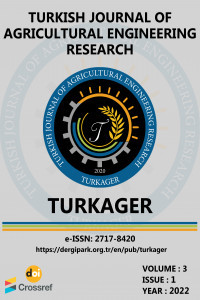A microcontroller - Based Irrigation Scheduling Using FAO Penman-Monteith Equation
A microcontroller - Based Irrigation Scheduling Using FAO Penman-Monteith Equation
Irrigation, Crop water use Automation, Scheduling, Penman-monteith,
___
- Agugo BAC, Muoneke CO, Eno-Obongo EE, Asiegbu JE (2009). A Theoretical Estimate of Crop Evapotranspiration and Irrigation Water Requirements of Mungbean (Vigna Radiata) In a Low Land Rain Forest Location of Southeastern Nigeria. In Electronic Journal of Environmental, Agricultural and Food Chemistry, 8(9); p. 720-729.
- AQUASTAT (2016). Water Uses. http://www.fao.org/nr/water/aquastat/water_use/index.stm, accessed 9th August, 2019
- Dorji K, Dorji SD and Tshering P (2017). Irrigation Scheduling and Water Requirements for Citrus Mandarin (Citrus Reticulata Blanco) - A case study from Drujegang, Dagana Bhutan. Bhutan
- Ewemoje TA, Fagbayide SD and Oluwasemire K.O (2018). Lysimeter Determination of Crop Coefficient of Drip Irrigated Jatropha Curcas. Federal University of Technology, Akure, Journal of Engineering and Engineering Technology. FUTAJEET Vol. 12 (1). p. 159 – 170.
- Gangwar, A., Nayak, T. R., Singh, R. M., & Singh, A. (2017). Estimation of crop water requirement using CROPWAT 8.0 model for Bina command, Madhya Pradesh. Indian Journal of Ecology, 44, 71-76.
- Kamienski, C., Soininen, J.P., Taumberger, M., Dantas, R., Toscano, A., Salmon Cinotti, T., Filev Maia, R., Torre Neto, A. (2019). Smart water management platform: Iot-based precision irrigation for agriculture. (19). p. 276.
- Kizito M, Amini N and Taha SU (2016). Design and Implementation of a Smart Irrigation System for Improved Water-Energy Efficiency. Conference: 4th IET Clean Energy and Technology Conference (CEAT 2016). DOI: 10.1049/cp.2016.1357
- Munoth P (2016). Sensor Based Irrigation: A Review. International Research Journal of Engineering and Technology (IRJET), NCACE conference proceedings, (p. 86). Jaipur, India.
- Ogidan OK, Onile AE and Adegboro OG (2019). Smart Irrigation System: A Water Management Procedure. Agricultural Sciences, 10; p. 25-31. https://doi.org/10.4236/as.2019.101003
- Ogidan OK., and Afia KR (2019). Smart irrigation system with an android-based remote logging and control. In IEEE Region 8 flagship conference (AFRICON), Gimpa Executive conference Centre, Accra, September, 25th – 27th 2019.
- Omid A, Pedro F, Luis G and Zita V (2020). Agricultural irrigation scheduling for a crop management system considering water and energy use optimization, Energy Reports, 12(1). p. 133-139. https://doi.org/10.1016/j.egyr.2019.08.031.
- Raeth PG (2020). Moving beyond manual software-supported precision irrigation to human-supervised adaptive automation. African Journal of Agricultural Research, 16(11), p. 1548-1553.
- Rodriguez D, Reca J, Martinez J, Lopez-Luque R and Urrestarazu M (2015). Development of a New Control Algorithm for Automatic Irrigation Scheduling in Soilless Culture. Article in Applied Mathematics & Information Sciences 9(1); p. 47-56.
- Sandeep K. and Deepali. Y (2017). A Survey on Automatic Irrigation System Using Wireless Sensor Network. International Journal of Current Engineering and Scientific Research. Volume-4, Issue 8
- Surendran U, Sushanth CM, Mammen G and Joseph EJ (2017). FAO-CROPWAT model-based estimation of crop water need and appraisal of water resources for sustainable water resource management: Pilot study for Kollam district-humid tropical region of Kerala, India. Current Science (00113891), 112(1).
- Torres-Sanchez R, Navarro-Hellin H, Guillamon-Frutos A, San-Segundo R, Ruiz-Abellón MC and Domingo-Miguel RA (2020). Decision Support System for Irrigation Management: Analysis and Implementation of Different Learning Techniques. (12). p. 548
- Wardlaw R and Bhaktikul K (2004). Applications of Genetic Algorithms for Irrigation Water Scheduling. Scotland. UK.
- Yadav D, Awasthi MK. and Nema RK. (2018). Study on crop water requirement of field crops under different climatic conditions of Madhya Pradesh. Agricultural Science Digest, 38 (2).
- Yogesh GG, Devendra SC and Hitendra CC (2016). A Review on Automated Irrigation System using Wireless Sensor Network. International Journal of Advanced Research in Electronics and Communication Engineering (IJARECE) Volume 5, Issue 6.
- Zia H, Rehman A, Harris NR, Fatima S and Khurram M (2021). An Experimental Comparison of IoT-Based and Traditional Irrigation Scheduling on a Flood-Irrigated Subtropical Lemon Farm. Sensors. 21(12): p. 4175. https://doi.org/10.3390/s21124175
- Yayın Aralığı: Yılda 2 Sayı
- Başlangıç: 2020
- Yayıncı: Ebubekir ALTUNTAŞ
A microcontroller - Based Irrigation Scheduling Using FAO Penman-Monteith Equation
Olugbenga Kayode OGİDAN, Samuel Dare OLUWAGBAYIDE, Thomas ALE
Uğur ÖZKAN, Nesim YILDIZ, Celal PEKER
Mathematically Predicting the Performance Rate of Plow-Type Trenchless Machine
Maney Ayalew DESTA, Getachew Shunki TİBBA, Mubarek Mohammed ISSA, Wariso HEYİ
Development of a Cowpea Threshing Machine
Mohamed MANSOUR SHALABY REFAAAY, Ahmed SHAWKY EL-SAYED, Mokhtar COTTB AHMED AWAD
Abdelgawad SAAD, Hani MANSOUR, Elsayed ALİ, Mostafa AZAM
Simulation-Optimization Modelling of Yield and Yield Components of Tomato Crop
Nura Jafar SHANONO, Lawal AHMAD, Nuraddeen Mukhtar NASİDİ, Abdul'aziz Nuhu JİBRİL, Mukhtar Nuhu YAHYA
Development and Performance Evaluation of a Hand Operated Maize Sheller
